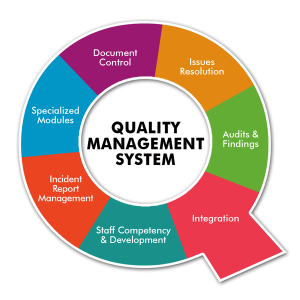
A quality management system (QMS) is defined as a formalized system that documents processes, procedures, and responsibilities for achieving quality policies and objectives. A QMS helps coordinate and direct an organization’s activities to meet customer and regulatory requirements and improve its effectiveness and efficiency on a continuous basis.
ISO 9001:2015, the international standard specifying requirements for quality management systems, is the most prominent approach to quality management systems.
While some use the term “QMS” to describe the ISO 9001 standard or the group of documents detailing the QMS, it actually refers to the entirety of the system. The documents only serve to describe the system.
Quality management systems serve many purposes, including:
- Improving processes
- Reducing waste
- Lowering costs
- Facilitating and identifying training opportunities
- Engaging staff
- Setting organization-wide direction
BENEFITS OF QUALITY MANAGEMENT SYSTEMS
Implementing a quality management system affects every aspect of an organization’s performance. Benefits of a documented quality management system include:
- Meeting the customer’s requirements, which helps to instill confidence in the organization, in turn leading to more customers, more sales, and more repeat business
- Meeting the organization’s requirements, which ensures compliance with regulations and provision of products and services in the most cost- and resource-efficient manner, creating room for expansion, growth, and profit
These benefits offer additional advantages, such as helping to communicate a readiness to produce consistent results, preventing mistakes, reducing costs, ensuring that processes are defined and controlled, and continually improving the organization’s offerings.
